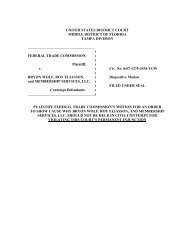Gasoline Price Changes - Federal Trade Commission
Gasoline Price Changes - Federal Trade Commission
Gasoline Price Changes - Federal Trade Commission
Create successful ePaper yourself
Turn your PDF publications into a flip-book with our unique Google optimized e-Paper software.
GASOLINE PRICE CHANGES:<br />
C. Government Regulations Can Affect Retail <strong>Gasoline</strong> <strong>Price</strong>s.<br />
In addition to zoning regulations, a number of other government regulations can affect<br />
retail gasoline prices. See Box 5-1 for an example of how various regulations can effect retail<br />
gasoline prices. Local and state taxes and regulations regarding how stations may sell gasoline<br />
are two examples.<br />
Box 5-1: Hawaii<br />
Hawaii provides an example where a number of local factors and regulations contribute to higher<br />
gasoline prices. For example, the price for regular unleaded gasoline in Hawaii for May, 2005,<br />
averaged $2.45 per gallon, including federal, state and local taxes, compared with $2.13 per gallon<br />
nationwide. (These prices reflect the average of retail prices collected and published by the Oil <strong>Price</strong><br />
Information Service (OPIS), a private company). There are several reasons for this.<br />
First, costs are higher in Hawaii than on the mainland. Crude oil and gasoline must be shipped via<br />
tanker several thousand miles to reach Hawaii. The shipping costs may reach as high as $0.14 per<br />
gallon. See ICF Consulting, Implementation Recommendation for Hawaii Revised Statutes Chapter<br />
486H, <strong>Gasoline</strong> <strong>Price</strong> Cap Legislation, at 21, exhibit 2.5 (2005), at http://www.hawaii.gov/budget/<br />
puc/dockets/05-0002_ICF_2005-04-15.pdf. Part of the shipping costs includes the cost of complying<br />
with the Jones Act, which adds additional costs to any product transported by vessel between U.S.<br />
ports. See Chapter 4(III) supra. In addition, Hawaii’s two refineries are small by mainland standards.<br />
Also, land in Hawaii is expensive, which contributes to higher retail costs. These higher retail costs in<br />
Hawaii are reflected in higher retail margins on gasoline. The retail margin for 2004 averaged $0.213<br />
per gallon in Hawaii compared with $0.076 per gallon nationwide. EIA, DOE/EIA-0487(04),<br />
Petroleum Marketing Annual 2004, at 57 tbl.31. (We define retail margin here as the price of regular<br />
gasoline sold through retail outlets excluding taxes less the DTW price.).<br />
Second, gasoline taxes are significantly above average in Hawaii. In December 2004, state and local<br />
taxes averaged $0.256 per gallon nationwide, but were $0.388 per gallon in Hawaii. This accounts for<br />
roughly $0.13 per gallon of the pump price difference. See API, Nationwide and State-by-State Motor<br />
Fuel Taxes (Nov. 2004), at http://api-ec.api.org/filelibrary/GastaxNovember2004Final.pdf. The<br />
amount of local taxes varies within Hawaii and is higher on Maui and in the city of Honolulu than<br />
elsewhere. See HawaiiGas<strong>Price</strong>s.Com, GasBuddy Organization Inc., US Fuel Tax Rates by State, at<br />
http://www.hawaiigasprices/com/tax_info.aspx, (June 22, 2005).<br />
Third, a variety of state laws likely contribute to higher gasoline prices in Hawaii. Hawaii enacted<br />
“anti-encroachment” legislation in 1997 that limits oil companies and jobbers from opening stations<br />
near dealer-operated stations. This has an effect similar to that of divorcement legislation. See Section<br />
III, supra. Also, Hawaii set rent caps for lessee-dealer stations. The caps may prevent wholesalers<br />
from obtaining a competitive rate of return on lessee-dealer stations and may result in fewer such<br />
stations and higher wholesale prices. Within Hawaii it is difficult to obtain fee-simple ownership to<br />
land, and this may reduce the incentive to invest in gas stations. Finally, in September 2005, a<br />
wholesale gasoline price cap is scheduled to go into effect. Although the contours of the price cap are<br />
not yet set, this legislation has the potential to induce exit or discourage future entry from the<br />
wholesale market, creating shortages, while allowing retailers to continue to charge market rates.<br />
Competition and the Effects of <strong>Price</strong> Controls in Hawaii's <strong>Gasoline</strong> Market Before the State of Hawaii,<br />
(Jan. 28, 2003) (Statement of Jerry Ellig, FTC, Office of Policy Planning), at<br />
http://www.ftc.gov/be/v030005.htm.<br />
110<br />
FEDERAL TRADE COMMISSION, JUNE 2005
















